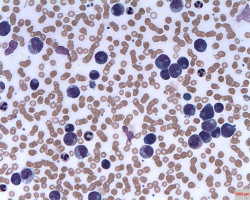
The Phase III ASCEND study of the Bruton’s Tyrosine Kinase inhibitor (BTKi) acalabrutinib in relapsed or refractory chronic lymphocytic leukaemia (CLL) has been presented at the 2019 European Hematology Association (EHA) Annual Meeting.
The study tested acalabrutinib versus rituximab with idelalisib (IdR) or bendamustine (BR), commonly used CLL regimens.
BRK inhibition is a well-established therapeutic approach in CLL.
Acalabrutinib is a highly selective, potent inhibitor of BTK that has previously demonstrated substantial activity and improved tolerability in patients with CLL.
In this study, acalabrutinib monotherapy significantly improved progression-free survival (PFS), with a more tolerable safety profile, compared with IdR/BR in patients with relapsed or refractory CLL, reducing the risk of disease progression or death by 69% after 16.1 months.
At 12 months, 88% of patients on acalabrutinib showed no disease progression compared to 68% for the control arm, with tolerability consistent with the known profile.
These results are significant because there is a need for an effective but also well-tolerated BTKi for patients with CLL.
The ASCEND study results indicate that acalabrutinib has the potential to change current practice by providing a well-tolerated, highly effective BTKi treatment option.
Source: EHA